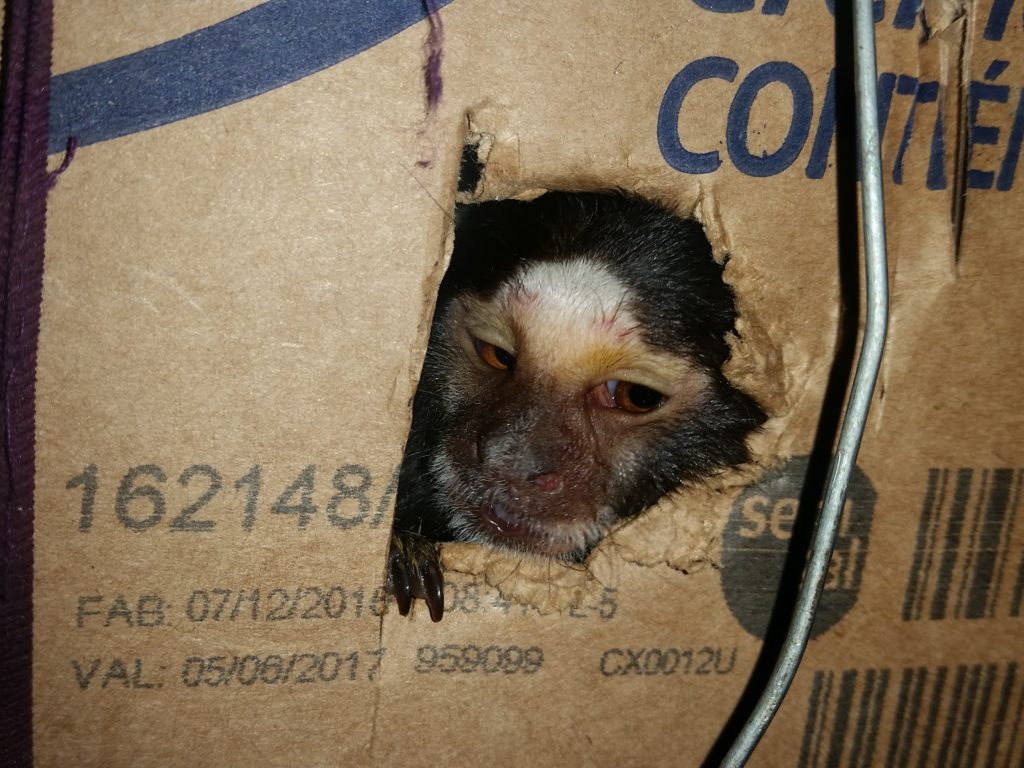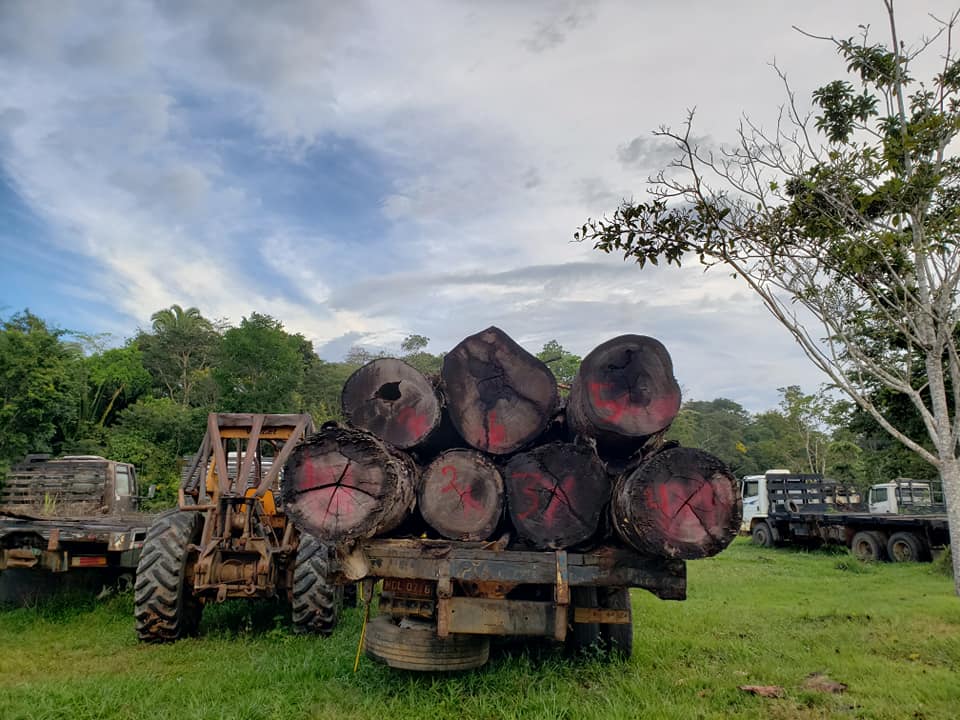非法和不可持續野生動植物貿易造成影響——我們可以如何應對呢?
非法或不可持續野生動植物貿易影響全球生物多樣性、生態系統服務、人們的生計和經濟。 世界各地的專家提出警告,指出此類活動對環境帶來的相關的威脅,並提供遏制其增長的路線圖。

在世界各地進行野生動植物貿易,範圍廣泛,包括:植物、動物、真菌、微生物及其衍生產品。這些交易物品用途亦相當之多,例如可作食品、具藥用價值、裝飾、時裝和家具。交易形式方面,可以活生生的買賣,像作為寵物、研究或於動物園、水族館和植物園展覽。
野生動植物在本土社區扮演不同的社會和經濟角色,可在本土收成和消耗,或通過複雜的跨國貿易鏈傳遞到其他國家。
赫爾辛基大學芬蘭自然歷史博物館 (Luomus) 研究員 Caroline Fukushima 說 :「提起野生動植物貿易,人們可能會想到象牙走私或野生寵物貿易。 但野生動植物貿易在我們的日常生活中較人們想像來得普遍。舉例來說,用木材製成給家庭晚膳的餐桌,可能是野生動植物貿易的產品。

Illegal logging in Brazilian Amazon. Photo: Marco Antônio de Freitas.
野生動植物貿易影響其他物種,包括人類
野生動植物貿易可以是合法的、非法的或不受監管的、可持續的或不可持續的。
Fukushima 說 :「然而,人們需要意識到合法貿易,不一定意味著『可持續生產或貿易』。而非法或不可持續的野生動植物貿易 (IUWT) 是導致全球生物多樣性喪失和生物絕種的五個主要驅動因素之一。
同樣來自 Luomus 的 Pedro Cardoso (帶領出版這些刊物的研究員之一) 說 :「外來入侵物種、人畜共患病、貪污和犯罪網絡之間的聯繫、對當地和全球經濟的負面影響,以及導致不公義的社會、經濟和環境,都是野生動植物貿易沒有受到好好的監控,帶來的部分負面後果。
跨界別合作刻不容緩
以世界科學家聯盟發布「世界科學家對人類的警告」的宣言為基礎,一個由生物保育學家、行動主義分子、執法人員、從業員及其他行動者組成的國際團體。這個團體希望審查非法和不可持續的野生動植物貿易,並提醒我們注意它如何對人類福祉帶來負面影響。
該團體討論處理非法和不可持續的野生動植物貿易時面對的挑戰,並提出了一些切實可行的解決方案。 他們還強調迫切需要在行動者和學科之間進行更多合作,以遏止負面影響。
Caroline Fukushima說 :「了解野生動植物消費的文化根源和驅動因素,再加上考慮其文化和社會細微差別至關重要,有助我們制定更有可能成功的保育策略。
作者指出,仍然有必要衡量野生動植物貿易對所有生物多樣性的範圍、規模和影響。 這些戰略取決於準確和可靠的生物多樣性知識,這些知識由科學家和其他專家(包括公民科學家和保育者)與國際和當地非政府組織與當地社區一起探索、鑽研的。
遏制非法和不可持續的野生動植物貿易,需要社會學、經濟學、犯罪學、社會營銷和計算機科學等不同學科的專才參與,在各階段,作出全面性的保育行動。
已經有許多技術和工具可用於分析、追踪、監測和遏制不可持續和非法的野生動植物貿易。 然而,它的興起表明僅靠執法不足以阻止此類活動。 教育是改變消費者行為的關鍵因素。 每個人都應該參與打擊不可持續或非法的野生動植物貿易。
非法或不可持續的野生動植物貿易有哪些風險?
1)非法或不可持續的野生動植物貿易是導致絕種的主要因素之一。
2) 物種喪失可能對其他依賴物種及其生態系統造成申連性的影響。
3)促使其他地區物種的入侵,以及它們可能攜帶的疾病。
4) 非法或不可持續的野生動植物貿易,包括非法採伐、影響氣候調節、農作物授粉和其他生態系統服務。
5)售賣活生生動物的市場,可能導致全球大流行的人畜共患疾病的爆發。
6) 犯罪網絡深入參與野生動植物販運,擴大了貪污腐敗的範圍、過度情況和消費模式。
7) 非法或不可持續的野生動植物貿易有可能影響當地經濟,特別是如果當地經濟是依賴野生動植物提供的生態系統服務。
8) 非法或不可持續的野生動植物貿易和相關的犯罪活動,包括逃稅和洗黑錢,影響全球經濟。
如何減少或杜絕非法或不可持續的野生動植物貿易?
作為保育者、政策制定者或執法人員:
9) 確保可持續性貿易。
10) 了解野生動植物需求的文化和社會層面,並設計鉅細無遺
的策略遏制非法或不可持續的野生動植物貿易。
11) 聽取依賴野生動植物貿易的當地社區領袖意見,鼓勵他們參與保育。
12) 要求為在線野生動植物貿易制定更佳的法則和作出監管。
13) 確保所在國家或地區所設立保護野生動植物的施法制度能有效地打擊非法或不可持續的野生動植物貿易。
14) 支持科學研究,並將之用作制定保育行動和政策的框架。
15) 讓所有人接觸到,遏制非法野生動植物貿易的技術和資源。
16) 建立國際專業人士網絡,包括生物學、法醫學和貿易監管,參與保育工作。
作為消費者:
17) 選購來自可持續來源、合法獲得的產品,及確保貿易可持續的舉措。
18) 需要政治意願和資金支持遏制非法或不可持續的野生動植物貿易的舉措。
19) 提高對非法或不可持續的野生動植物貿易的認識,減少或改變危害生物多樣性的野生動植物消費習慣。
20) 不要在市場、旅遊中心、網上或其他地方,購買非法或不可持續的野生動植物及相關產品。
21)對描繪非自然人類與野生動植物互動的社交媒體帖子讚好及分享之前,請三思。
22) 請勿支持提供人類與野生動植物互動的旅遊景點或志願服務機會。
Links to the papers:
Cardoso et al. (2021) Scientists’ warning to humanity on illegal or unsustainable wildlife trade. Biological Conservation. https://doi.org/10.1016/j.biocon.2021.109341
Fukushima et al. (2021) Challenges and perspectives on illegal or unsustainable wildlife trade. Biological Conservation. https://doi.org/10.1016/j.biocon.2021.109342
Want to help us curb illegal and unsustainable wildlife trade?
Contact us: https://biodiversityresearch.org/people/
https://www.facebook.com/biodiversityresearch/
https://www.youtube.com/channel/UCF1mAiGL_G8iwUfnJHnymKQ
Suggested links:
Alliance to Counter Crime Online: https://www.counteringcrime.org/our-issues
TRAFFIC: https://www.traffic.org/
Contact authors: Pedro Cardoso (pedro.cardoso@helsinki.fi) and Caroline Fukushima (caroline.fukushima@helsinki.fi), Finnish Museum of Natural History, University of Helsinki.
About the authors:
Caroline Sayuri Fukushima (caroline.fukushima@helsinki.fi)
Caroline is a postdoc researcher at Finnish Museum of Natural History at the Laboratory for Integrative Biodiversity Research. She has been working with evolution, taxonomy, natural history, and behavior of arachnids since she was an undergrad student. All the experience obtained during years working with those amazing but unfairly feared animals is being used to understand the drivers of the legal and illegal trade of live tarantulas and scorpions and its impact on wild populations, aiming to propose effective ways to protect them.
Pedro Cardoso (pedro.cardoso@helsinki.fi)
Curator at the Finnish Museum of Natural History, docent in Ecology at the University of Helsinki. Cardoso works in global conservation science, as well as in policy and the development of new computational methods to track species extinctions. With a predilection for spiders, he quickly realized that global solutions are needed for all of biodiversity, including the small creatures that truly make the world work. He is leading the Laboratory for Integrative Biodiversity Research (https://biodiversityresearch.org), which includes a team of 20 researchers who work in subjects as varied as conservation biology, biogeography and biodiversity informatics.
Authors:
Patricia Tricorache, Natural Resource Ecology Laboratory (NREL), Colorado State University, USA. orcID: 0000-0003-1493-1028
Adam Toomes, Invasion Science & Wildlife Ecology Lab, University of Adelaide, Australia. orcID: 0000-0003-4845-1073
Oliver C. Stringham, School of Mathematical Sciences, University of Adelaide, Australia. orcID: 0000-0002-4224-7090
Emmanuel Rivera-Téllez, National Commission of Use and Knowledge of Biodiversity (CONABIO), Mexico. orcID: 0000-0001-6340-8001
William J. Ripple, Department of Forest Ecosystems and Society, Oregon State University, USA.
Gretchen Peters, Center on Illicit Networks and Transnational Organized Crime (CINTOC), Washington, DC, USA.
Ronald I. Orenstein, wildlife conservationist from Ontario, Canada. orcID: 0000-0002-1194-3835
Carlos A. Martínez-Muñoz, Zoological Museum, Biodiversity Unit. University of Turku, Finland.
Thais Q. Morcatty, Oxford Wildlife Trade Research Group, Oxford Brookes University, Oxford, UK. orcID: 0000-0002-3095-7052
Stuart J. Longhorn, Arachnology Research Association, Birmingham, UK. orcID: 0000-0002-1819-3010
Chien Lee, Institute of Biodiversity and Environmental Conservation, Universiti Malaysia Sarawak, Malaysia. orcID: 0000-0001-9578-2305
Sabrina Kumschick, Stellenbosch University and Kirstenbosch Research Centre, South Africa. orcID: 0000-0001-8034-5831
Marco Antonio de Freitas, Instituto Chico Mendes de Conservação da Biodiversidade (ICMBio), Brazil.
Rosaleen V. Duffy, Department of Politics and International Relations, University of Sheffield, UK. orcID: 0000-0002-6779-7240
Alisa Davies, World Parrot Trust, Hayle, Cornwall, UK.
Hubert Cheung, University of Queensland, Australia, and Atlas Conservation Initiative, Toronto, Canada. orcID: 0000-0002-5918-9907
Susan M. Cheyne, Oxford Brookes University, Oxford, UK. orcID: 0000-0002-9180-3356
Jamie Bouhuys, from the Netherlands.
João P. Barreiros, Centre for Ecology, Evolution and Environmental Changes (cE3c), Azores University, Portugal. orcID: 0000-0003-4531-6685
Kofi Amponsah-Mensah, Centre for Biodiversity Conservation Research, University of Ghana, Ghana. orcID: 0000-0002-8625-1681
